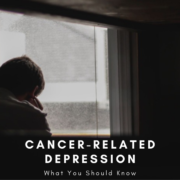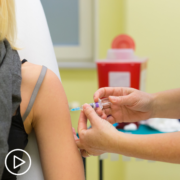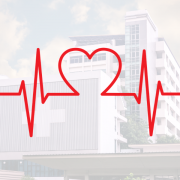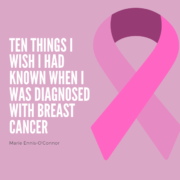Cancer-Related Depression: What You Should Know
An overwhelming 40 percent of people are projected to experience cancer at some point in their lifetime and of those patients, over 10 percent will suffer from depression related to their illness. There are a variety of reasons a person’s mental health can be impacted by cancer. Common factors are if the cancer is terminal or invasive, feeling a lack of autonomy or control over one’s life, feelings of guilt or shame for behaviors associated with cancer like smoking, loss of identity resulting from weakness, appearance changes, or loss of friends or a job.
The mental health of cancer patients is often less considered, but its impact on the progression of cancer is strongly considered by doctors, with over 70 percent of oncologists believing that mood affects the progression of cancer.
Wherever you are in your journey with cancer –– if you were recently diagnosed, if you’re a caregiver, relative, or friend of a patient, or if it is a long part of your past –– it’s important to consider mental, not just physical, health. Even cancer survivors can develop depression after they are declared cancer-free. Fear of recurrence, permanent changes to the body and overall health, and lack of community or understanding take a huge mental toll on patients.
For a variety of reasons, it’s important to recognize symptoms of depression in yourself or loved ones who live with cancer. Keep reading to explore methods of acknowledging and alleviating depression related to cancer.
Common symptoms to look out for:
- Loss of interest in things you used to enjoy
- Irritability
- Frequent crying
- Lack of motivation
- Feelings of worthlessness
- Sleep changes
- Fatigue
- Appetite loss
- Decreased libido
Methods of coping
Get professional help
As with any serious mental health issue, it is best to see a mental health professional. A mental health professional such as a therapist or a psychiatrist can help you view your mental health holistically, not just in the context of cancer, and help determine triggers and various treatment plans individualized for each patient.
Although cancer patients may feel overwhelmed with doctor’s appointments, there are increasingly more flexible options like online psychiatry services that incorporate treatments like talk therapy with the option to prescribe an antidepressant if needed.

Surround yourself with community
Feeling supported by friends and family in difficult times is extremely important for one’s well being. In fact, it has been found that a lack of friendship is a major diagnostic criterion for a variety of mental health issues.
If you have lacked friendships or support in the past, cancer may be an opportunity to bond with those with similar experiences. There are often a variety of cancer support groups associated with charities and hospitals that help cancer patients establish community and social assistance. Some even organize retreats and wellness clinics so it is worth looking into the resources available to you. Your oncologist, for example, may be able to point you in the right direction.
If you find it difficult to keep up with your friendships, or if you lack the energy to socialize in a way that feels comfortable, pets are also found to be extremely therapeutic in the way that they provide a sort of social support. For example, dogs can provide a sense of companionship and help lower stress levels by increasing “feel-good” hormones like oxytocin in their owners. Pets like dogs even help promote a healthy lifestyle by walking them and helping their owners socialize with other dog owners at places like a dog park. This is an especially beneficial option for introverted individuals.

Make an effort to laugh
Laughter is also therapeutic, and luckily also extremely accessible. Whether it be with family and friends or by watching a comedy on Netflix, laughter can counterbalance the somberness of cancer treatment and recovery. Laughter is even considered a serious treatment for stress and depression in the medical community. However, it’s not something that can be prescribed, it has to be actively sought.
Be aware of the content you’re consuming and ask yourself whether it lightens or dampens your mood. When you pick a movie to watch or a book to read, if not a comedy try and choose something lighthearted. Ask your family and friends to send you pictures of their pets or funny videos. Go after whatever makes you happy and promotes laughter in your life!
It is completely natural to experience overwhelming emotions and even develop depression while experiencing, and even long after, cancer. Cancer is not only a diagnosis but an experience that changes nearly all aspects of a person’s life. Whether it be you yourself or a close friend or family member, it is important to recognize not just the physical, but the mental health implications of cancer. There are many ways to support someone who is experiencing cancer-related depression. Try experimenting with different options to see what works for you.










